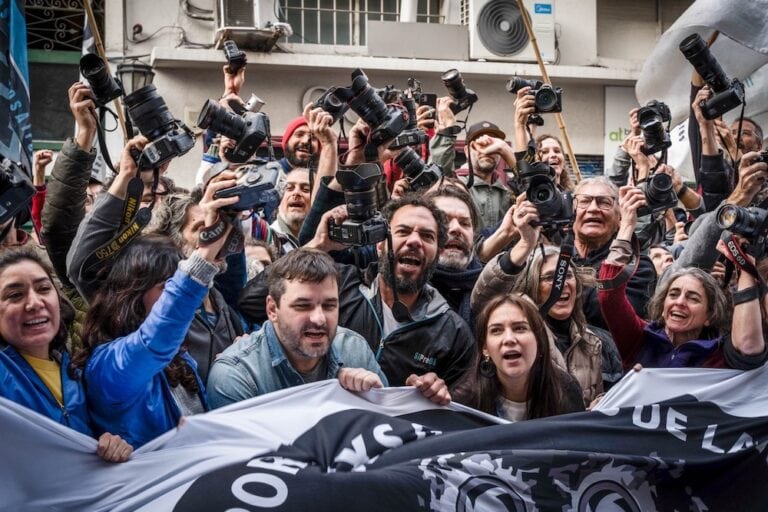(WPFC/IFEX) – The WPFC has given a Fund Against Censorship grant to Argentinean journalist and author Mariano Saravia, an investigative reporter who has been sued for civil defamation after writing a book naming former armed forces and police officers whom he alleges participated in assassinations, tortures and disappearances of people opposed to the former military […]
(WPFC/IFEX) – The WPFC has given a Fund Against Censorship grant to Argentinean journalist and author Mariano Saravia, an investigative reporter who has been sued for civil defamation after writing a book naming former armed forces and police officers whom he alleges participated in assassinations, tortures and disappearances of people opposed to the former military dictatorship.
Because of the revelations in his book, Saravia has been sued by both a retired military officer and a former policeman for alleged defamation. The judge presiding over one of the proceedings has agreed to garnishee Saravia’s salary as a reporter for “La Voz del Interior” newspaper in Córdoba Province.
The case – which was included in the OAS’s Special Rapporteur for Freedom of Expression’s 2005 Annual Report – stems from Saravia’s book, “La sombra azul” (“The Blue Shadow”), about his investigations into human rights violations during Argentina’s military rule in the 1970s and 1980s. Many of the perpetrators of those crimes have escaped prosecution, and Saravia, like other Argentinean journalists and authors, is being judicially persecuted for making these accusations.
“The purpose of courts is to administer justice, not to be used as tools of censorship to silence the legitimate work of investigative reporters,” said WPFC Executive Director Mark Bench. “Mr. Saravia is being judicially harassed in order to silence him because his work is making uncomfortable revelations about a painful period of Argentinean history. We hope our financial assistance will enable him to obtain the best legal defense available.”
The Fund Against Censorship funds will be administered by the Foro de Periodismo Argentino (Argentinean Journalistic Forum), that country’s foremost press freedom group, which is also assisting other journalists under similar judicial harassment.
WPFC believes this case involves a number of fundamental components that could turn it into a landmark example of press freedom efforts not only in Argentina but also in the entire the region. The two plaintiffs have used laws, specifically Art. 1089 of the Civil Code, dealing with “insults” to a person’s honor. This article, like many others, was to be reformed or eliminated per a friendly settlement of several Argentinean cases at the Inter-American Commission on Human Rights (IACHR) in exchange for the cases not to be taken to the Inter-American Court of Human Rights. The State, however, never introduced the reforms, and the abusive laws are still being used to silence journalists in the country.
The case also has implications that are shared by almost the entire region since, most Latin American countries, like Argentina, must confront unsolved human rights abuses during past dictatorial regimes.
WPFC also believes this is an arbitrary case that will bring international attention to flawed legal arguments used to silence Saravia and to the threats and intimidation he has suffered since the publication of his book.
According to the Annual Report of the OAS Special Rapporteur for Freedom of Expression, in July of 2005, Saravia “found a dozen caliber-45 bullets in front of his home.” A month later, “a swastika appeared painted on the wall of his house.” And in October, Saravia “found a dead bird hanging from his garage ceiling.”
“The Saravia case does have its genesis in the civil code and extends into the larger issues of IACHR compliance that have ramifications beyond just defamation and insult,” said WPFC’s General Counsel Kevin Goldberg.
WPFC hopes its financial and moral support will accomplish the following goals:
– Enable Saravia to continue his defense and avoid paying abusive “moral damage compensations” for up to US$20,400.
– Overturn an anachronistic and harsh press law and help force the Argentinean State comply with its commitment to IACHR to decriminalize defamation laws and to reform its civil code, including the introduction of modern press freedom concepts, such as real malice.
– Reignite the debate within the Inter-American justice system about Argentina’s unfulfilled promises to reform its laws and put the threat of taking the case to the Inter-American Court of Human Rights back on the table.
– Send a clear signal to former armed forces and police officers in Argentina that their attempts to silence responsible journalists will have international repercussions.
The Fund Against Censorship provides financial assistance for legal costs to journalists who are the target of judicial harassment and other forms of intimidation. The grant is made by WPFC on behalf of the Coordinating Committee of Press Freedom Organizations, which includes, in addition to WPFC: the International Press Institute (Vienna, Austria); Inter American Press Association (Miami, USA); International Association of Broadcasting (Montevideo, Uruguay); World Association of Newspapers (Paris, France); Commonwealth Press Union (London, England); North American Broadcasters Association (Toronto, Canada); International Federation of the Periodical Press (London, England); and the Committee to Protect Journalists (New York, USA).
Since 1977 the World Press Freedom Committee, an international coalition representing 45 press freedom groups throughout the world, has made numerous grants in its cooperative program to help news media and journalists of the developing world and more recently, Asia and Central and Eastern Europe. Each request is well screened, and the success of the program depends upon generous donations from foundations, businesses and individuals.


